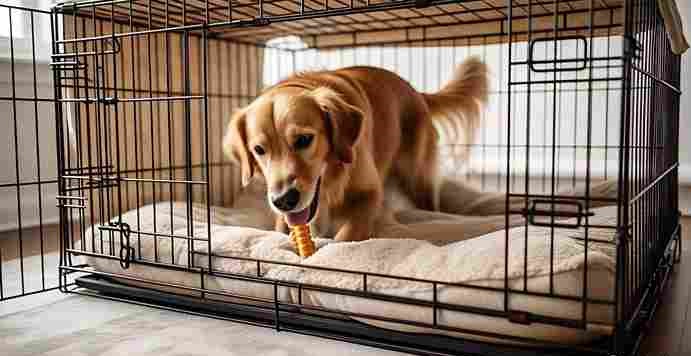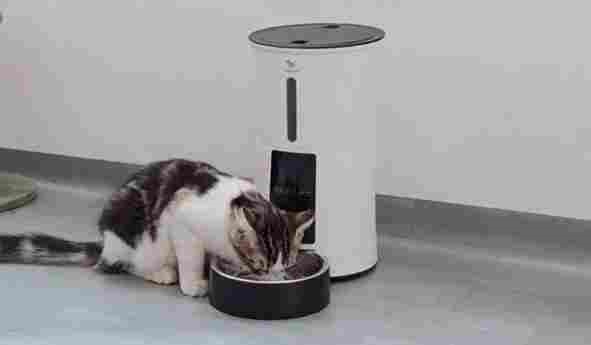Why does my dog bark in the crate at night — and how do I stop it?
Dogs that are often left alone at night in their kennel may bark because of separation anxiety, boredom, irregular routines, or bathroom needs. To eliminate these behaviors, establish a peaceful bedtime routine; turn the crate into a happy place; and do not give your attention to the barking. With regularity, the majority of dogs will learn the new behavior quickly.
QUICK OVERVIEW
- Stick to a consistent bedtime and potty schedule
- Make the crate cozy, safe, and inviting
- Don’t give attention to barking unless for bathroom needs
- Use calming aids like pheromone diffusers or chew toys
- Consult a vet or trainer if barking continues
Table of Contents
🐾 Why Dogs Bark in the Kennel at Night
Some common causes include:
- Separation anxiety: Feeling alone or unsafe
- Excess energy: Not enough exercise during the day
- Lack of routine: Dogs thrive on predictable schedules
- Uncomfortable crate: Too cold, too small, or unfamiliar
- Bathroom needs: Especially for puppies or seniors
You might like this: How Long Can I Leave My Dog Alone?
🕰️ 1. Establish a Calming Bedtime Routine

Keep a Consistent Schedule
Dogs are very fond of routine. They appreciate being fed, taken for a walk, and given a potty break at the same time every day, particularly before going to bed.
Try safe calming solutions like:
- Natural calming chews (e.g., Zesty Paws, VetIQ)
- Pheromone diffusers (Adaptil plug-ins)
- Soft background music or white noise
💡 Tip: Avoid overexciting play right before bed — it can backfire!
🏠 2. Make the Crate a Comfortable and Safe Space

Size Matters
Your dog should be able to stand, turn around, and lie down easily.
Add Comfort and Familiarity
- Use soft bedding or crate pads
- Include a familiar toy or blanket
- Cover the crate partially with a breathable cloth to make it feel like a den
Build Positive Associations
- Feed your dog in the crate
- Offer puzzle toys or chew treats
- Never use the crate for punishment
⚽ 3. Manage Daytime Energy
Ensure Proper Exercise
A tired dog is a quiet dog. Try:
- 2+ walks daily
- Playtime (fetch, tug-of-war)
- Mental stimulation (training, treat puzzles)
Don’t Overstimulate Before Bed
Avoid engaging in rough games or energetic training sessions with your kids just before going to bed — it could get them more excited rather than calming them down.
🚫 4. Address the Barking (Without Reinforcing It)
Ignore Attention-Seeking Barking

Only if it is an emergency in the restroom should you speak, touch, or look at your dog while he is barking. Otherwise, it is better not to do any of these.
Reward Quiet
When your dog is quiet — even if just for a short period — immediately give a reward or some positive talk.
Potty Break Protocol
If your dog might need to go:
- Take them straight outside on a leash
- No playing or talking
- Return them quietly to the crate
Know When to Seek Help
Persistent barking may mean:
- Separation anxiety
- Fear of confinement
- Pain or discomfort
Consult a vet or certified trainer for professional advice.
🧠 5. Address Underlying Anxiety or Fear
Signs of Separation Anxiety:
- Barking starts immediately after you leave
- Pacing, drooling, or destructive behavior
- Clinginess during the day
Work with a trainer using gradual desensitization and counter-conditioning.
Fear or Discomfort Triggers:
- Sudden loud noises
- Cold drafts or poor crate placement
- New or unfamiliar environments
Make changes to the environment and create good experiences for the crate
(FAQs)
Q1: Should I ignore my dog barking in the crate at night?
Yes, if it’s for attention. Respond only if they might need a bathroom break.
Q2: How long will it take to stop nighttime barking?
With a consistent routine, most dogs improve within 3–7 days. Anxiety-related barking may take longer.
Q3: What if my dog suddenly starts barking at night?
Rule out medical issues or changes in the environment, and ensure their routine hasn’t been disrupted.
Q4: Can crate barking be a sign of illness?
Yes. If barking is new and intense, consult your vet to rule out pain, discomfort, or illness.
Q5: Are there crate alternatives for anxious dogs?
Try x-pens, dog-safe rooms, or sleeping in the same room as your dog during the adjustment phase

Karim Kaifi is an experienced pet owner and writer. He shares practical, research-backed advice based on over 10 years of caring for cats and dogs.






